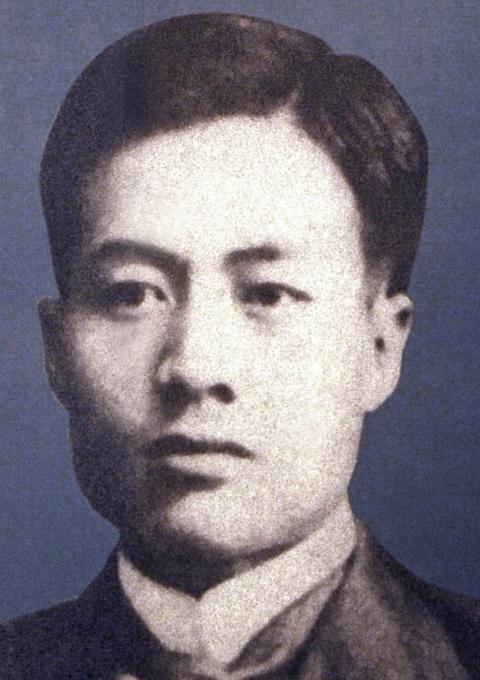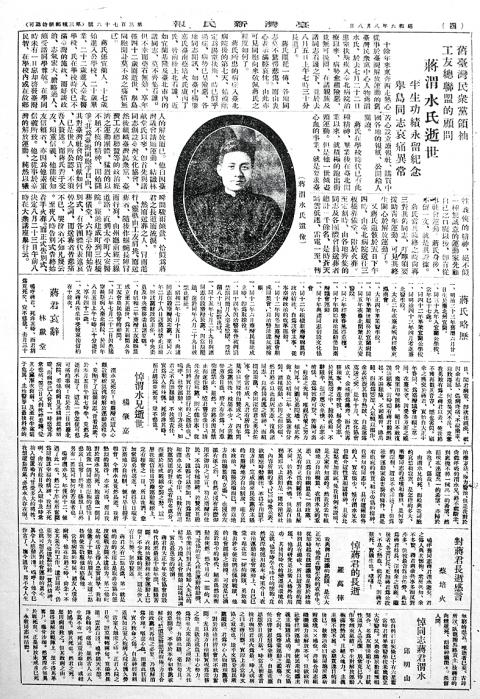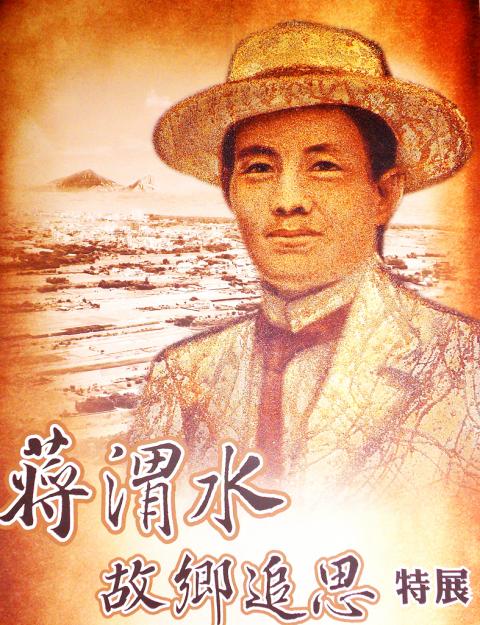On Aug. 5, 1931, Chiang Wei-shui (蔣渭水), an outspoken Taiwanese nationalist during the Japanese colonial era, passed away from typhoid after more than two weeks in the hospital. The man would later be considered a pioneer of Taiwanese democracy and one of the most important leaders of nonviolent resistance against Japanese rule.
The day before his untimely death at age 40, Chiang was still devoted to his cause, encouraging his comrades to “liberate our people.”
On Aug. 23, more than 2,000 people showed up at the funeral ceremony hall, despite warnings by the Japanese colonial government and a strong police presence. Next to Chiang’s photograph hung banners with phrases such as “your spirit will not die” and “liberation fighter.” The police examined and censored parts of the funeral speech, but let the ceremony go on. Right before the procession began, rain started to fall. The crowd, now numbering 5,000, followed Chiang’s hearse undeterred to his final resting place on Taipei’s Dazhi Mountain (大直山).

Taipei Times file photo
FREEDOM FIGHTER
Like many people and events before 1945, Chiang’s name has become mostly forgotten until recent decades. Today, he transcends Taiwan’s political divide, commanding the respect of both the Chinese Nationalist Party (KMT) and the Democratic Progressive Party (DPP).
Chiang, who is often dubbed the Sun Yat-sen of Taiwan (台灣的孫中山), was born in Yilan in 1891, four years before the Japanese took over Taiwan. It was during medical school that he became an outspoken nationalist activist. Armed rebellions against colonial rule mostly ceased after 1915, and intellectuals turned to other ways to fight for autonomy and self-determination.

Photo : Han cheung, Taipei Times
After five years of running his own hospital, Chiang participated in the first petition to the Japanese government for a Taiwanese representative assembly in 1921. Later that year, believing that Taiwanese were suffering from “cultural malnutrition” under Japanese rule, he founded the Taiwan Cultural Association (台灣文化協會) with Lin Hsien-tang (林獻堂), a founder of the Taiwan People’s Party (台灣民眾黨), and others. After convincing the authorities that they wouldn’t participate in political activities, the association held its first meeting with more than 1,000 attendees.
The association aimed to foster a sense of Taiwanese culture and nationalism through seminars, film screenings and other activities. Chiang often criticized the government through the Chinese-language Taiwan Minpao (台灣民報) newspaper, and the Japanese kept a close eye on his activities.
Chiang was arrested and sentenced to four months in jail in 1923, the first of nine subsequent imprisonments.

Taipei Times file photo
When the Cultural Association split into left and right wings in 1927, Chiang founded the Taiwan People’s Party after much government interference, the first legal political party ever in Taiwan. The party adopted Sun’s Three Principles of the People (三民主義) as its political philosophy. Chiang later became involved in worker’s and farmer’s rights.
During this time, his party presented to the League of Nations about the Japanese selling opium in Taiwan and shed light on the Wushe Incident (霧社事件) where more than 600 Aborigines were killed in an armed uprising against the Japanese.
In 1931, the government forcefully dissolved the party, and Chiang died soon after. Taiwanese democracy continued in 1934 when Koo Hsien-jung (辜顯榮) became the first Taiwanese to be named to the Japanese House of Peers. Local assemblies were established in 1935, but after Japan invaded China in 1937, all social movements were banned, and with it the beginning of the imperialist assimilation policy.
Chiang’s idealism is worth noting. He believed that unity in Asia would bring world peace. He wrote that since people in Taiwan were of Chinese descent (中華民族), yet citizens of Japan, they held the key to achieving good relations between the two countries.
OTHER EVENTS THIS WEEK IN HISTORY
The Wulai cable car, the first of its kind in Taiwan, saw its first passengers on Aug. 6, 1967. Each car could carry up to 18 people, and a round trip ticket cost NT$18 per person — not a small price for those days.
The Taipei Fine Arts Museum was established on Aug 8, 1983, on the former site of the United States Taiwan Defense Command headquarters. The command was abandoned in April 1979 following the annulment of the Sino-American Mutual Defense Treaty.
HOLIDAYS
Taiwan is the only country in the world to observe Father’s Day on Aug. 8. This practice originated in 1945 in China, as World War II drew to a close. The following year, prominent Shanghai citizens petitioned the government to make it an official observance to commemorate the fathers who died in the war. The KMT continued the tradition after its retreat to Taiwan, while the Chinese Communist Party adopted the international norm of the third Sunday in June.
Taiwan in Time, a new column about Taiwan’s history that is published every Sunday, spotlights important or interesting events around the nation that have anniversaries this week. Each edition features a main story with other noteworthy tidbits.

Towering high above Taiwan’s capital city at 508 meters, Taipei 101 dominates the skyline. The earthquake-proof skyscraper of steel and glass has captured the imagination of professional rock climber Alex Honnold for more than a decade. Tomorrow morning, he will climb it in his signature free solo style — without ropes or protective equipment. And Netflix will broadcast it — live. The event’s announcement has drawn both excitement and trepidation, as well as some concerns over the ethical implications of attempting such a high-risk endeavor on live broadcast. Many have questioned Honnold’s desire to continues his free-solo climbs now that he’s a

As Taiwan’s second most populous city, Taichung looms large in the electoral map. Taiwanese political commentators describe it — along with neighboring Changhua County — as Taiwan’s “swing states” (搖擺州), which is a curious direct borrowing from American election terminology. In the early post-Martial Law era, Taichung was referred to as a “desert of democracy” because while the Democratic Progressive Party (DPP) was winning elections in the north and south, Taichung remained staunchly loyal to the Chinese Nationalist Party (KMT). That changed over time, but in both Changhua and Taichung, the DPP still suffers from a “one-term curse,” with the

Jan. 26 to Feb. 1 Nearly 90 years after it was last recorded, the Basay language was taught in a classroom for the first time in September last year. Over the following three months, students learned its sounds along with the customs and folktales of the Ketagalan people, who once spoke it across northern Taiwan. Although each Ketagalan settlement had its own language, Basay functioned as a common trade language. By the late 19th century, it had largely fallen out of daily use as speakers shifted to Hoklo (commonly known as Taiwanese), surviving only in fragments remembered by the elderly. In

Lines between cop and criminal get murky in Joe Carnahan’s The Rip, a crime thriller set across one foggy Miami night, starring Matt Damon and Ben Affleck. Damon and Affleck, of course, are so closely associated with Boston — most recently they produced the 2024 heist movie The Instigators there — that a detour to South Florida puts them, a little awkwardly, in an entirely different movie landscape. This is Miami Vice territory or Elmore Leonard Land, not Southie or The Town. In The Rip, they play Miami narcotics officers who come upon a cartel stash house that Lt. Dane Dumars (Damon)